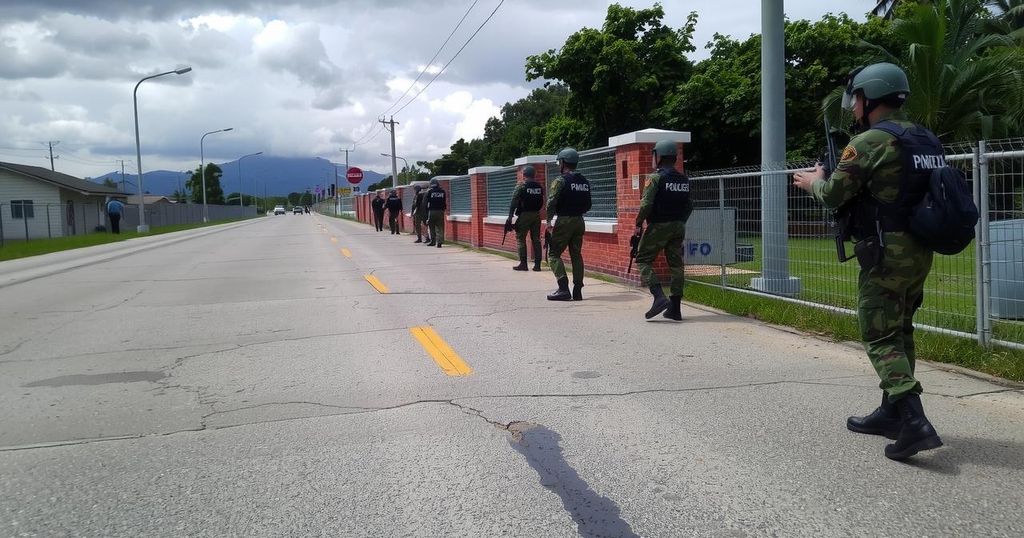Colombia Prepares for Maduro’s Inauguration Amid Border Security Concerns

Colombia’s appointment of Ambassador Milton Rengifo for Maduro’s inauguration is met with criticism as President Petro declines to attend due to election legitimacy concerns. The government has increased border security amid expected protests against Maduro, highlighting tensions between Colombia and Venezuela’s political landscape and responses from former leaders.
Colombia has appointed Ambassador Milton Rengifo to represent the nation at Nicolás Maduro’s inauguration on January 10, amid ongoing criticisms regarding the legitimacy of the election. President Gustavo Petro chose not to attend the ceremony, citing the questionable nature of the elections held under blockades and the recent arrest of press freedom advocate Carlos Correa. While he confirmed that Colombia would not sever diplomatic relations, Petro faced backlash for allowing Rengifo to attend. He defended his approach as a means to avoid exacerbating tensions and violence along the border, in contrast to the policies of former President Iván Duque, who he asserted enforced an unnecessarily harsh stance against Venezuela.
In response to concerns during the lead-up to the inauguration, Colombia has intensified security measures along its borders, particularly in regions prone to criminal activity from armed groups. The Armed Forces have mobilized approximately 3,700 troops to secure border areas against potential unrest stemming from the event. A command post in Norte de Santander has been established to facilitate coordination among relevant authorities, while local officials have implemented regulations, such as a temporary sale ban on alcohol, to ensure public safety during these proceedings.
As Maduro’s inauguration approaches, widespread protests are anticipated across global cities, including Bogotá, where Venezuelans plan to voice their dissent against Maduro’s regime. Opposition leader Edmundo González, who won the popular vote in Venezuela, is expected to arrive shortly before the inauguration, despite threats issued by Maduro’s government against him and former Latin American leaders accompanying him. The situation has escalated tensions between Petro’s administration and former President Duque, the latter openly criticizing Petro’s approach to the crisis and calling for accountability regarding Venezuela’s political situation.
In a combative response from Venezuela, Interior Minister Diosdado Cabello delivered threats against former leaders who attempted to support González, emphasizing the regime’s disapproval of foreign involvement. Former President Duque has also hinted at his intention to travel to Caracas, potentially contributing to further diplomatic contention and mobilizing opposition to Maduro’s regime amidst a delicate geopolitical climate.
The tumultuous political landscape of Venezuela has drawn international attention, particularly following the controversial elections that Nicolás Maduro has conducted amid severe allegations of electoral fraud. Colombia, having humanitarian and security concerns over the ongoing crises in Venezuela, has adopted a diplomatic stance marked by both criticism of Maduro’s legitimacy and strategic engagement to protect its border security. The evolving situation has revealed ideological divides in Colombian politics, particularly concerning how to best address the Venezuelan crisis while also managing domestic repercussions in a region impacted by armed conflict and socio-economic upheaval. As calls for protests and international support for Venezuelan opposition leaders grow, Colombia’s actions reflect broader geopolitical tensions and the struggle for democratic representation in Latin America.
Colombia’s diplomatic relations with Venezuela remain complex, as reflected in President Gustavo Petro’s decision to send Ambassador Milton Rengifo to Maduro’s inauguration while maintaining that he would not attend due to concerns over the election’s legality. As protests erupt globally against the Maduro regime, Colombia has heightened its border security to preempt any spillover violence, illustrating the delicate balance between maintaining diplomatic ties and protecting national interests. Former Colombian leaders have also engaged in the discourse, reflecting the polarized responses to Venezuela’s ongoing political crisis and the implications for regional stability.
Original Source: thecitypaperbogota.com







